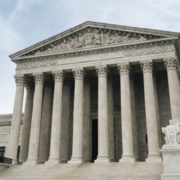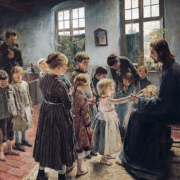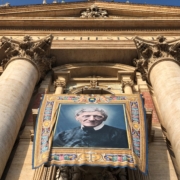Bishop Flores: What Every Catholic Kid Needs for School
Does “Catholic education” begin in Catholic schools—or is there something more foundational?
Bishop Daniel Flores of Brownsville, Texas, has an intriguing answer.
Last week, in his St. Hildegard Lecture at the University of Mary in Bismarck, North Dakota, Bishop Flores argued that there are “habits of the soul” that, when developed “prior to formal education,” help students become more aware of the relationships among physical and abstract realities and God.
This, he says, prepares a student to study disciplines as varied as “grammar, rhetoric, music, biology, medicine, morality and mystical contemplation.”
I spoke with Bishop Flores following the lecture to discuss the implications for Catholic families and teachers.
Back to the Garden
By encouraging formation that occurs “prior to formal education,” Bishop Flores does not propose some sort of Catholic preschool, although developing good habits in the home and parish at a young age is important.
Instead, by “prior” he means fundamental, a prerequisite for a good education at any age.
In his lecture at the University of Mary, he noted that St. Hildegard of Bingen and other great saints exhibited a “synthetic impulse, by which I mean a purposeful concern for the deeper connections that bind all that exists.” They grasped how things and ideas relate to other parts of reality, the “kinship” and order in God’s creation.
This, argued Bishop Flores, was partly a result of their upbringing within a Catholic culture and worldview.
For St. Hildegard, the synthetic impulse was “fertile ground” to produce impressive writings, musical compositions, poetry, moral teaching and scientific studies without ever having the sort of formal schooling that is common to most great thinkers. She had a mind “like Jacob’s ladder,” said Bishop Flores, that ascended to the sublime and descended into practical concerns without difficulty.
This sense of both divine purpose and the relatedness of all reality is valuable to learning, Bishop Flores argued. The synthetic impulse enables the student to gain a deeper understanding and appreciation for the world around us.
It is “somewhat natural to human beings” and therefore available to non-Catholics, but for a faithful Catholic, the synthetic impulse:
…becomes robust and fruitful with baptism into the faith; it comes with looking at life and reality from the gut awareness that the source of all that is, is the Good God; this good God loves immensely, and was interested in a garden at creation, not a wild and chaotic forest of beings related only by a competitive need to survive.
He recommended that Catholics spend more time with other people who appreciate the connectedness of all things, especially how humans relate to each other. He mentioned several categories of good company: children, whose thoughts naturally tend to both realism and imagination; the poor, whose dependency makes them appreciate the “reciprocity of human relations;” poets, writers and other artists, whose work is “reflecting the creative act of the WORD;” farmers, who are attuned to the “natural rhythms of nature;” and the saints, because charity is “the gift of knowing how to relate.”
The confidence of Catholics
I explored these themes further with Bishop Flores after the lecture. If the synthetic impulse is foundational to a good education, I wondered, does it suggest particular methods and practices in formal Catholic education, or is it cultivated entirely outside of our schools?
Bishop Flores believes that Catholic educators certainly can help nurture students’ synthetic impulse—“if you don’t have it, you have to develop it,” he said. But the point of his lecture was to suggest that Catholics, because of their faith, culture and worldview, tend to come to school already confident in the relatedness of things, making them well-prepared for learning and discernment.
Catholic educators should ask, he said, “How well habituated is the student body to seeing things as interrelated? How well have they maintained a traditional Catholic sense of the connectedness of reality?”
Where the synthetic impulse is noticeably lacking, a Catholic school can help.
“But it works much better if there is already a foundation in the home,” Bishop Flores said.
I asked whether he thinks that, given the very secular culture in which most Catholic families live today, many homes still provide this foundation for young Catholics?
He acknowledged the “very steep undertow” in our culture, which is highly individualistic. But he said there remain “expressions of very deep Catholic life” in prayer, spirituality, music and the arts. This sets many young people “on the road” to perceiving truth and the relations of things.
As for Catholic schools and colleges, it’s clear that many today have drifted away from the integrated learning and strong core curricula that helped reinforce the synthetic impulse for previous generations of Catholics. In his lecture, Bishop Flores lamented the “intellectual culture of endless disciplines and sub-disciplines happily unconcerned with what a colleague across the campus may be doing or thinking.”
What has been lost, he said, “is the sheer human joy of pursuing the signs of relationality we know are present in things that may at times appear disparate and unrelated.” Young people should wonder about the unity of creation, but academia wants them to analyze facts in isolation.
Still, that’s not the case throughout Catholic education. Bishop Flores said he is “impressed” by some Catholic schools. It “can be a blessing” that smaller schools have limited resources, he said, because teachers and parents have to work together, increasing the cohesiveness of the community.
He experienced that cohesiveness himself when studying at the University of Dallas, a faithful Catholic college. He was also “very impressed” by what he saw last week at the University of Mary.
Bottom line: there’s much to be restored in education, but “Catholic institutions are in the best position to do it.”
Flesh and blood
Earlier I mentioned Bishop Flores’ recommendation that Catholics spend more time with people in whom the synthetic impulse is especially strong. I asked him to relate this to Catholic education—can schools help provide this for students and faculty?
Obviously schools offer the opportunity for adults to engage with children, one of the groups he mentioned. It’s the encounter with children that draws grade school teachers to the profession. But Bishop Flores suggested that college professors are often too isolated in their disciplines and even socially.
“Many theology and philosophy professors, to put it bluntly, need to get out more,” he said.
We discussed the value of older students mixing with younger ones, an aspect of homeschooling that I’ve found particularly healthy for my own kids. Bishop Flores said he encourages high school students to mentor younger ones and develop an ethos of “looking out for each other.”
Catholic education can also introduce students to the poor. But the encounter should be more than “social justice” activities and providing material aid, Bishop Flores suggested. It should help students relate humanly to the people they help by getting to know them.
“The poor are not a category,” he said. “We’ve eclipsed the personal encounter, because we’ve categorized people.”
With regard to experiencing the arts, we talked especially about the Hispanic Catholic culture prevalent in his Brownsville Diocese, with its “very tactile” feasts, processions and devotions. Bishop Flores said these are reminders of early European expressions of Catholic life, like the ornate Polish churches he explored as a youth, which can be “extremely powerful” in transmitting the faith and encouraging wonder.
“The Church needs to recapture some of the ethnic beauty of the Church,” he said.
And students should be introduced to the saints, especially by the display of relics. Bishop Flores finds that young people “are the most responsive” to such tangible displays of both divine and material reality.
“Christianity becomes an idea until you put some flesh and blood on it,” he said.
True Catholic education
After our conversation, it occurred to me that Bishop Flores’ contemplation of the synthetic impulse is helpful to developing a proper sense of Catholic education.
Instilling good “habits of the soul” in young people prepares them for formal schooling, but it is already part of Catholic education in its own right. Catholic education is not an institution with the label “Catholic.” It is the project of forming young people in the faith for fully human living and to gain the inheritance promised by Christ.
So when Catholic parents and parishes nurture the synthetic impulse by teaching the faith and living Catholic culture, it is as much an exercise of Catholic education as teaching theology in a classroom.
Blessed John Henry Newman said Catholic education should integrate religion and science so as “to reunite things which were in the beginning joined together by God, and have been put asunder by man.” By appreciating “the grandly expressive relation between all things that are,” Bishop Flores added, “a Christian is called by grace to be the mediator of a related world that struggles to live up to its relations.”
Now that sounds like a Catholic education that lives up to its name.
This article first appeared at The National Catholic Register.

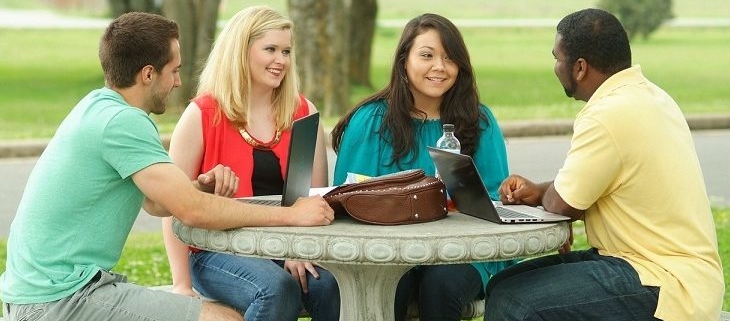
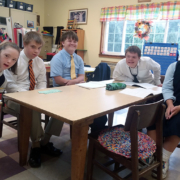

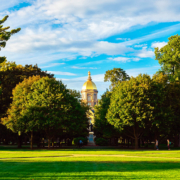 Photo by David Mark via Pixabay CC0
Photo by David Mark via Pixabay CC0 